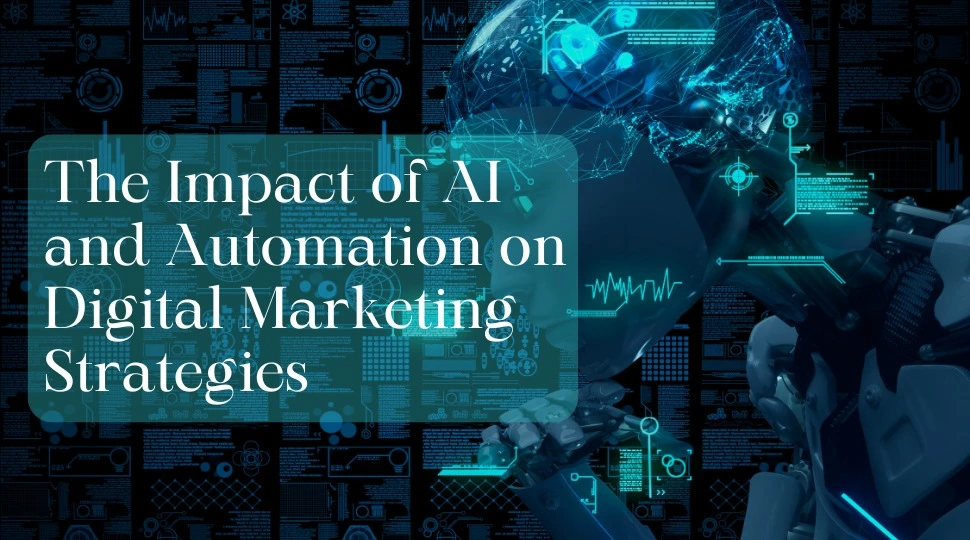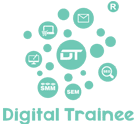AUTOMATION STRATEGIES
The Impact of AI and Automation on Digital Marketing Strategies
Artificial Intelligence (AI) and automation are revolutionising digital marketing by creating new, high-converting campaigns; personalising experiences; and streamlining operations. Gone are the days when AI and automation concepts were relegated to science fiction; these technologies are now mainstream tools for marketers, shaping the digital marketing landscape in tremendous ways.
AI and automation are not buzzwords: they represent a major change in how the business world interacts with clients and digital marketing strategies. Chatbots answering consumer queries in real-time to AI-powered analytics that predict consumer behaviour-thus, such influences of such technologies are indeed vast. In this blog, we'll take you through the depth of how AI and automation impact digital marketing strategies, and why businesses need to embrace them for a competitive advantage.
Understanding AI and Automation in Digital Marketing
While looking for the good that AI and automation have brought to digital marketing, it's also important to understand what these are in the industry.
- Artificial Intelligence is an attempt to build machines that can think like humans. For example, in digital marketing, an AI algorithm can study loads of data, come up with patterns and make sense without the use of a human brain.
- Marketing automation is the use of software for the execution of repeating tasks, such as sending out bulk emails, posting on social media, or running an ad campaign. Although automation does not "think" like AI, it is efficient in handling substantial manual labour that other machines would be used for if they were not utilised by automation.
Combining AI with automation makes it a perfect duo, able to boost virtually any area of digital marketing, from analysing data and customer service to content creation and various forms of personalised marketing campaigns.
AI Role in Digital Marketing
-
Personalization at Scale:
One of the significant contributions of AI to digital marketing is the capability to provide personalization at scale. Marketers have long known that personalised messages result in better engagement and conversions. However, drafting personalised messages for each customer was a time-consuming task-until AI came along.
AI algorithms scan through user data, from browsing habits to purchase history, and personalise recommendations and content for individual users. For instance, Netflix and Amazon use AI to suggest shows or products based on things you've previously watched or bought. This personal touch deepens the connection between brands and consumers, driving loyalty and increasing customer lifetime value.
With the knowledge of how every customer likes, behaves, and interacts with the brand, AI allows marketers to create micro-segments and deliver highly targeted content. This level of precision will boost engagement and increase chances of conversion.
-
Better customer experience via chatbots:
One of the most common applications of AI being used in digital marketing today is chatbots. The virtual assistant can converse with customers in real-time and reply to their various queries, provide recommendations, and even process transactions.
There are two forms of advantages. One is in terms of cost-cutting; businesses may be able to provide 24/7 customer service without needing human agents available at all hours. This would save on operational costs while allowing customers to receive help at any given hour. The second area of advantage is that the chatbots can provide support to multiple streams of customer interaction whereas human agents may get overwhelmed by a large volume of incoming queries.
Advanced versions of these chatbots are even enabled to mimic human conversations, thereby making the interactions more fluid and friendly to interact with users. For instance, brands like Sephora use chatbots to enable customers to find products they would need or like given their preferences and their skin type, which enables a personal shopping experience without necessitating human intervention.
-
Predictive Analytics and Insights:
AI is at its best in data analysis. Given the amount of data generated online, it is impossible for human marketers to process and analyze all this information manually. However, AI-driven tools will be processing data and analyzing in real-time to report some findings of patterns, trends, and areas of insight for marketers to utilize in making strategic decisions.
Predictive analytics is one of the applications of AI that's gaining major ground in the digital marketing world. It predicts future trends, customer behavior, campaign performance with the help of statistical analysis of historical data and identifying patterns. AI can predict which customers are more likely to make a purchase, when they're likely to buy, and what kind of messaging will resonate with them. Marketers can then adjust their strategies using those insights and then make decisions based on data.
Predictive analytics makes better budget allowance possible as marketers can identify which channels, campaigns, and strategies are delivering the most ROI and target the most crucial areas using the forecast.
-
Content Creation with Artificial Intelligence (AI):
While human creativity cannot be rivaled, there is something strange about the emergence of AI that produces content at an incredible pace. AI-based tools, like GPT-3 that serves as the basis for tools like ChatGPT, generate written content, such as blog posts, product descriptions, and social media updates. These tools produce content much faster and more efficiently than humans and are completely invaluable to businesses, considering the volumes of content churned out regularly.
AI tools are also being used to optimise existing content. For instance, AI can scan through the readability, SEO performance, and other engagement metrics of a blog post to make suggestions on ways to enhance its effectiveness. Grammarly, Hemingway are some examples where AI is the basis of writing to make the words written clear, concise, and free from errors.
The news is that AI definitely is not going to replace human writers anytime in the near future but can be a powerful assistant to help the content creator streamline the workflow and concentrate on more strategic and creative tasks.
Automation in Digital Marketing: Streamlining the Process
-
Automated Email Marketing
Business Email marketing is undoubtedly one of the most indispensable tools, and sending campaigns from emails can be very time-consuming if done manually. Automation plays a pivotal role in these processes with the help of tools like Mailchimp, HubSpot, and ActiveCampaign, which enable marketers to set up user behaviours that automatically send campaigns.
For example, if a customer abandons his cart, automated emails can be sent reminding him of those items and encouraging completion of the purchase. If a customer places an order, automated follow-up emails can thank him and suggest more products. Automated workflows in this way ensure that the date and relevance of communication with customers work to enhance chances of conversion as well as loyalties towards the brand.
This also encompasses the development of highly segmented audiences through any criteria such as purchase behaviour, location, or engagement. This will increase engagement and result in highly targeted email campaigns, increasing the success of email marketing as a whole.
-
Social Media Scheduling and Posting
Another area where automation has been a game-changer is social media marketing. Usage of tools like Hootsuite, Buffer, and Sprout Social, among others, has the capability to schedule posts in multiple platforms all at once to maintain an online presence without being logged in day and night.
Other AI-based tools analyse user engagement statistics to post at the time when chances of maximum reach and engagement are the highest. This means marketers are going to save a lot of time designing high-quality content instead of worrying about when it should be posted.
-
Automated Ad Campaign
PPC is very much a core part of most digital marketing strategies, but managing campaigns can prove fairly labour-intensive. Google Ads and Facebook Ads have recently started offering such AI-driven features to help them automate optimization based on real performance data.
For instance, Google Ads uses AI to automatically bid in real time for optimising the campaigns for the best possible ROI for the advertisers. Facebook's ad platform might automatically target the ads toward the most likely people to engage based on the behaviour and preference to best improve the effectiveness of the campaign.
Automation enables continuously optimised ad campaigns, thus allowing marketers to strategize rather than have to manage day-to-day campaign operations.
"Success is the sum of small efforts, repeated day in and day out."
— Robert Collier
AI and Automation's Future in Digital Marketing
AI and automation are in their infancy. The future is going to hold even more revolutionary and exciting developments. For one, here are the following things we can expect once it becomes engrossed in these technologies:
- Greater levels of personalization: AI will continue honing the ability to deliver experiences that are hyper-personalised, making one-to-one connections at scale.
- Voice Search Optimization: With the increased usage of AI-based voice assistants such as Alexa and Google Assistant, content on the internet will have to be optimised for voice search also.
- AI Visual and Video Editing Tools: AI-based image recognition and video editing tools will become even more precise in terms of what visual content they can recognize and then edit, thus opening the way for new ways to engage audiences.
- Creative AI: AI will increasingly co-create for users by providing suggestions on design, copy, and strategy based on data analysis and user behaviour.
Conclusion:
Digital marketing strategies are greatly impacted by automation and artificial intelligence. What AI and automation give marketers is the capability to work smarter-not harder-through the help of automation in functions like repetitive ones, through differentiation in experience, and through data-driven insight. Human creativity and intuition must never be replaced but AI and automation do make mighty tools that amplify the effectiveness of digital marketing campaigns.
Businesses that adopt these technologies will not only have an edge but will also be competitively positioned better to adapt to the ever-changing digital scenario. Whether through personalised customer experiences, automated workflows, or AI-powered analytics, this is a future that is undoubtedly tied to AI and automation. The marketers of today must look into these technologies for how they can help strategize and make their strategies and success story a great one.
Palash Rewatkar
"I navigate the digital world with ease, turning algorithms into allies and trends into achievements."







